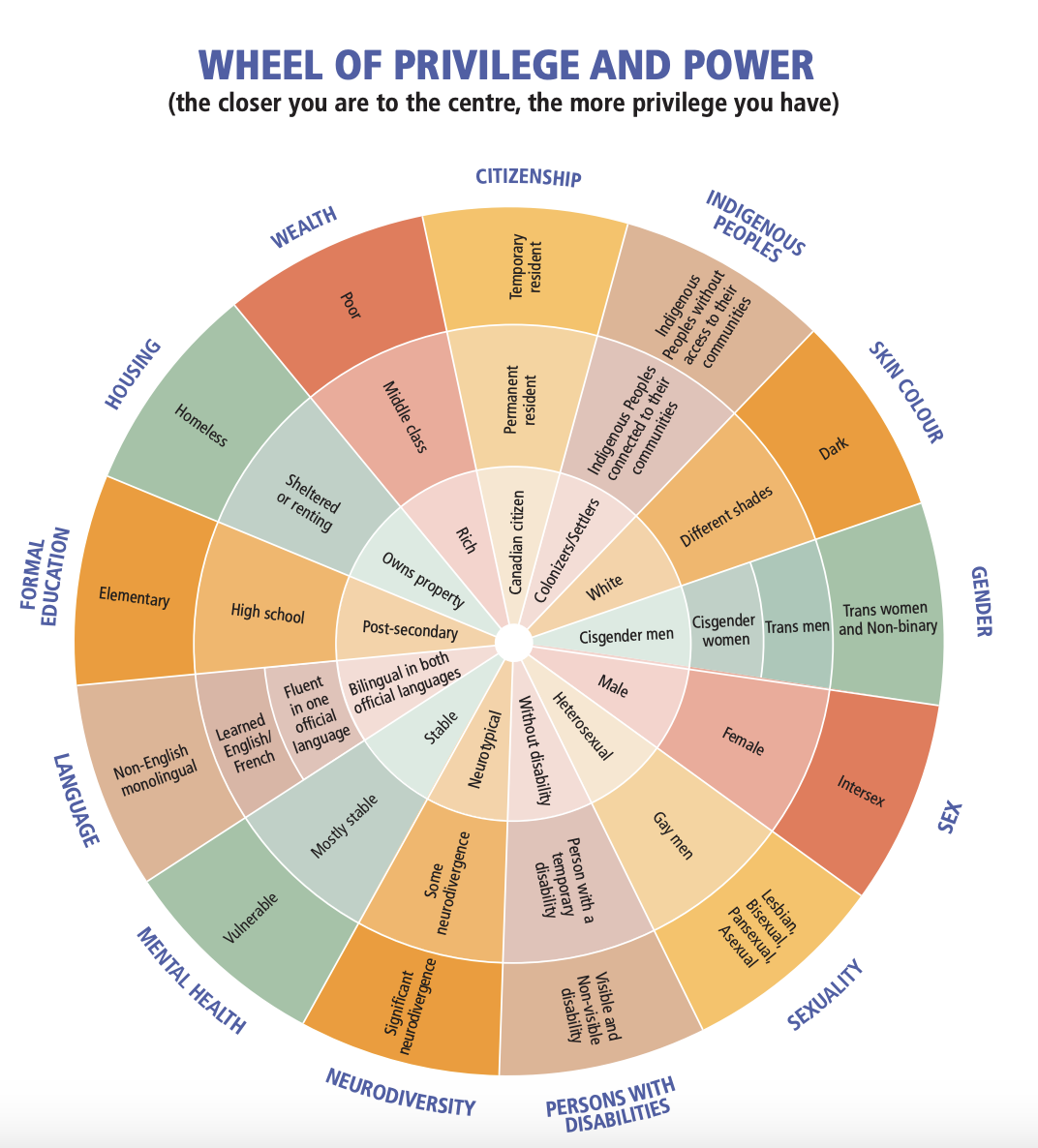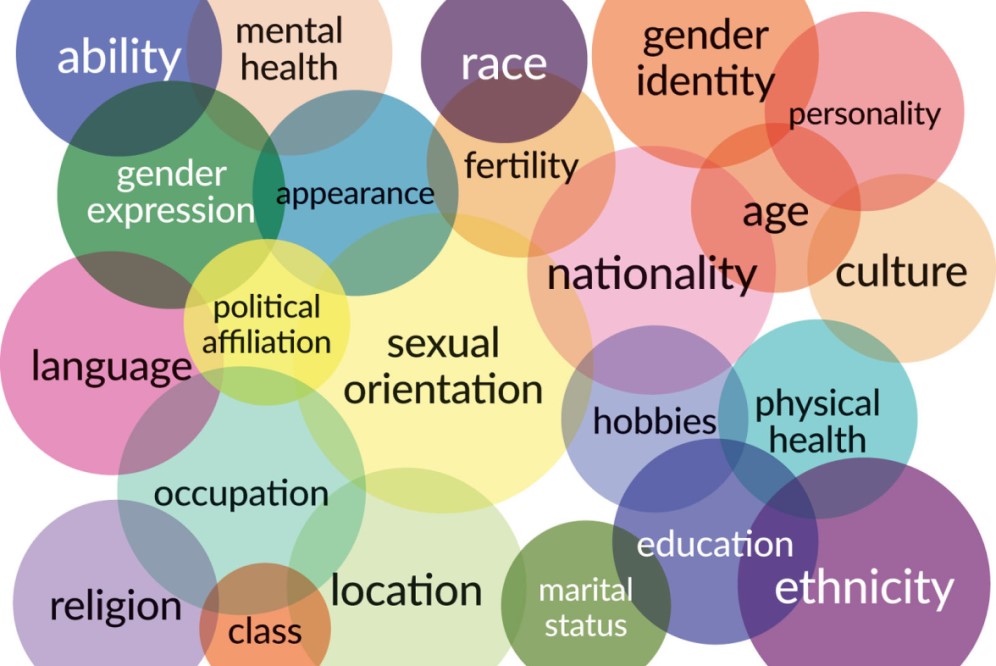2 Positionality and Self-Reflection
What is Positionality?
Positionality describes the unique set of beliefs, values, and location in time and space that shape how a person interacts with and perceives the outside world. It is interwoven in the dynamics of privilege and power. For instance, your gender, race, class, and other parts of your social identities affect and inform how you move through the world, the knowledge you produce and value, as well as the prejudices that are unintentionally or consciously filtered through everything you say, think, and do. (https://indigenousinitiatives.ctlt.ubc.ca/classroom-climate/positionality-and-intersectionality/)
How to Explore Your Own Positionality
Wheel of Privilege and Power
Retrieved from: https://www.canada.ca/content/dam/ircc/documents/pdf/english/corporate/anti-racism/wheel-privilege-power.pdf
 The graphic above uses the imagery of a wheel, sectioned off by the following social identities and respective categories:
The graphic above uses the imagery of a wheel, sectioned off by the following social identities and respective categories:
- Citizenship: citizen, documented, undocumented
- Skin colour: white, different shades, dark
- Formal education: post-secondary, high school, elementary
- Ability: able-bodied, some disability, significant disability
- Sexuality: heterosexual; gay men; lesbian, bi, pan, asexual
- Neurodiversity: neurotypical, neuroatypical, significant neurodivergence
- Mental health: robust, mostly stable, vulnerable
- Body size: slim, average, large
- Housing: owns property, sheltered/renting, homeless
- Wealth: rich, middle class, poor
- Language: English, Learned English, non-English monolingual
- Gender: cisgender man; cisgender woman; trans, intersex, nonbinary
Determining Self-Identity
Referring back to the identities in the Wheel of Power/Privilege think about how you define yourself, and where your salient social identities are located on the wheel. Get curious about:
- How close or far away from the centre are you?
- How does your level of power shift as you place yourself in different identity categories?
- Thinking about your institution, where do students, staff, administrators, and/or faculty reside?
To further explore your own positionality, we encourage you to review this article titled Social Identity Map: A Reflexivity Tool for Practicing Explicit Positionality in Critical Qualitative Research
What is Intersectionality?
Intersectionality refers to the interconnected nature of social categorizations such as race, class, gender, sexuality, disability, and others, and how they overlap and intersect in the lives of individuals, creating unique and complex systems of privilege and oppression.
In this video, What is Intersectionality? [1:54] by the National Association of Independent Schools (2018), Professor Kimberlé Crenshaw discusses the relationship between systems and processes of discrimination and overlapping or intersecting social identities.
The central idea of intersectionality is that people don’t experience just one form of discrimination or privilege at a time, but rather, they experience a combination of these factors that shape their experiences and access to opportunities in society.
Retrieved from: https://researchguides.library.syr.edu/fys101/intersectionality
Why is intersectionality important?
Below you will find questions to consider to reflect on the aspects of your identity. Use these as a starting point or guide to reflect on who you are and how you fit into broader communities. What questions do you think we’re missing? Are there questions you don’t feel comfortable answering? You can skip those questions!
- What country were you born in?
- Where do you feel most at home?
- What qualities do you most admire in a person?
- What’s a significant cultural tradition in your family or community?
- Have you ever faced a situation where your identity was misunderstood or misrepresented?
- What’s a book, movie, or piece of art that deeply resonates with your sense of identity?
- Have you ever taken part in an event or activity that celebrated diversity and inclusivity?
- What’s a personal achievement you’re particularly proud of, and how has your identity played a role in it?
- What do you value about your cultural or ethnic background?
Why does positionality matter in equity-based co-creation?
Cultivating the heartset and mindset to engage in equity-based co-creation (EqCC) requires inner reflection. This work can elicit uncertainty, discomfort, and personal transformation. To be effective in EqCC, practitioners commit to developing and expanding key skills and attributes; critically reflecting on their worldviews, assumptions, biases, and values; considering their roles in ensuring all voices are heard, respected and valued; and interrogating power and privilege. This requires the capacity to listen to others, particularly perspectives of voices that are heard less often. The work is difficult: it requires an accumulating tolerance for feeling vulnerable, as one’s own perspectives can be challenged, while remaining aspirational and having a shared excitement about potential transformation to be achieved.
How does your positionality shape your assumptions, biases, and values?
How might you interrogate power and privilege from your positionality?
Knowledge Checkpoint


